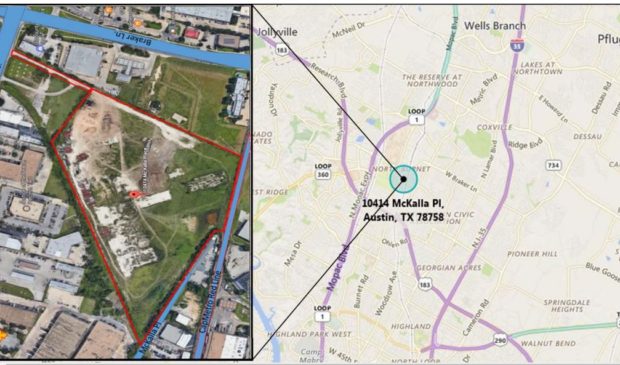McKalla proposals hold promise, with no promises from city
Tuesday, August 7, 2018 by
Chad Swiatecki Tuesday is the day when those with hopes of turning the city’s property into something other than a 20,000-seat soccer stadium will get a chance to convince City Council members that everything from open space and performance stages to high-concept mixed-use development would be preferable to professional sports.
The question is whether the presentation at today’s afternoon work session of the six plans submitted to the city will be anything more than a formality.
Memos and other materials related to the plan submission process have emphasized throughout that the city is not conducting a competitive process to develop the 24-acre parcel near the Domain. Rather, the submission process was opened after some Council members and residents said they wanted to see the city’s options while considering whether to move forward with a stadium agreement with Precourt Sports Ventures, the business group pushing to relocate the Columbus Crew Major League Soccer franchise to Austin.
One of the two plans turned in by Capella Capital Partners draws on negotiations with the city that began in 2016 after the firm purchased a small adjacent piece of land. All the others were crafted in a several-week rush in the hopes of convincing Council to hit the pause button on a process that PSV representatives contend needs to be completed Thursday with a vote to complete the stadium agreement.
“At this point with how far the city has gone in negotiating terms with Precourt, after we were told countless times they were going to put out the (request for proposals) in 2017, all we can do is put our best foot forward and try to get the fairest shot we can,” said Neil Francois, a co-founder and managing partner with Capella. “I think the fairest process and procedure to do would be to have an open RFP and let everyone have a shot and then make the best decision.”
Capella’s two plans include buying the land for $22 million to build a somewhat standard mixed-use project combining residential, office and retail, or a “Plan B” option with an $11 million purchase price that would see the firm co-develop the two parcels with PSV and locate the stadium there.
Another submission is a simple letter and legal outline from Capital Commercial Investments offering the city $17.75 million for the property, while the “Keep McKalla Weird” proposal outlines the advantages of emphasizing open space and performance areas there.
The full lineup of proposals and information on the McKalla process and the negotiations with PSV are available here.
John Chen, whose team submitted a mixed-use development proposal for McKalla anchored by a grocery store and including creative space, affordable housing and parkland, said he’s hopeful the attention from neighbors will convince some Council members to consider other possibilities for the property.
“The diverse set of proposals demonstrates there’s great energy of the community coming together with different visions for the site, and that shows that the city should take them seriously,” he said. “Everyone I’ve talked to seems very encouraged by the chance to ask some tough questions about how this asset can best be used in service of some of the issues like affordable housing that are facing the city.”
Tuesday’s presentations follow meetings last week where some Council members pressed PSV on some of the finer points of the recently negotiated term sheet that would serve as the basis for the final agreement, if Council votes to move forward on Thursday. Points of contention include the city’s responsibility for traffic management on game days, a late request for millions of dollars to pay for a Capital Metro rail station, and a push for a soccer academy run by the team to be open to girls as well as boys.
Those question marks leave the issue very much still up in the air, with the alternative development proposals also offering city leaders some practice at considering how to best utilize all of the vacant or idle city properties.
“This is an interesting opportunity to see the possibilities that are out there for all the public land that we have, how we can best put that to use,” Council Member Jimmy Flannigan said, highlighting warehouse property on Justin Lane or the city’s vacant former Home Depot space that have been drawing more attention in recent years.
“Some folks are just focused on the tax revenue side and how we can get the most from that, and as a policy the city should use public lands for community benefit first. So this is an exciting chance to consider what’s out there with these other tracts, and what could be done with them.”
Map courtesy of the city of Austin.
The Austin Monitor’s work is made possible by donations from the community. Though our reporting covers donors from time to time, we are careful to keep business and editorial efforts separate while maintaining transparency. A complete list of donors is available here, and our code of ethics is explained here.
You're a community leader
And we’re honored you look to us for serious, in-depth news. You know a strong community needs local and dedicated watchdog reporting. We’re here for you and that won’t change. Now will you take the powerful next step and support our nonprofit news organization?



